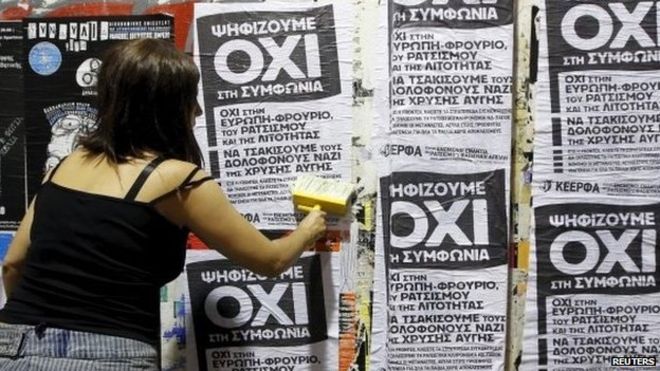
“No” vote in the Greek referendum on bailout terms would not provide Greece with an easy way out of its economic crisis
A “No” vote in the Greek referendum on bailout terms would not provide Greece with an easy way out of its economic crisis, the head of the grouping of eurozone finance ministers has said.
Jeroen Dijsselbloem’s comments came after Greek Prime Minister Alexis Tsipras told Greeks a “No” vote would lead to a “better agreement”.
But Mr Dijsselbloem insisted that suggestion was “simply wrong”.
Long queues of pensioners have formed outside Greek banks for a second day.
Meanwhile, the International Monetary Fund (IMF) has issued a report saying that the embattled country needs an extra 50bn euros ($55bn) over the next three years to stabilise its finances under the existing, disputed creditor plans.
In the report, the IMF cuts its forecast for Greek economic growth this year from 2.5% to zero, saying that changes in Greek policies and its financial outlook since early 2015 “have resulted in a substantial increase in financing needs”.
At the scene: Joe Miller, BBC News, Athens
Greece’s banks have now been closed to all but pensioners for four days, and Athenians have settled into a crisis routine.
At the stroke of midnight, queues form at cash machines as locals scramble to obtain their daily €60 ration.
Neighbours confer over which ATMs are still dispensing €20 bills – those with other denominations can only pay out €50 per day.
But despite the posters that adorn every tree and lamppost calling for “everyone to take to the streets”, the large protests of the past few days have largely died down.
In the radical left Exarcheia neighbourhood, exhausted young anarchists lounge outside bars and cafes, and let the banners hanging across the central square speak for them.
“No to EU and IMF terrorism,” reads one.
“€ + Germany = oppression,” reads another.
BBC
 Q FM Africa's Modern Radio
Q FM Africa's Modern Radio